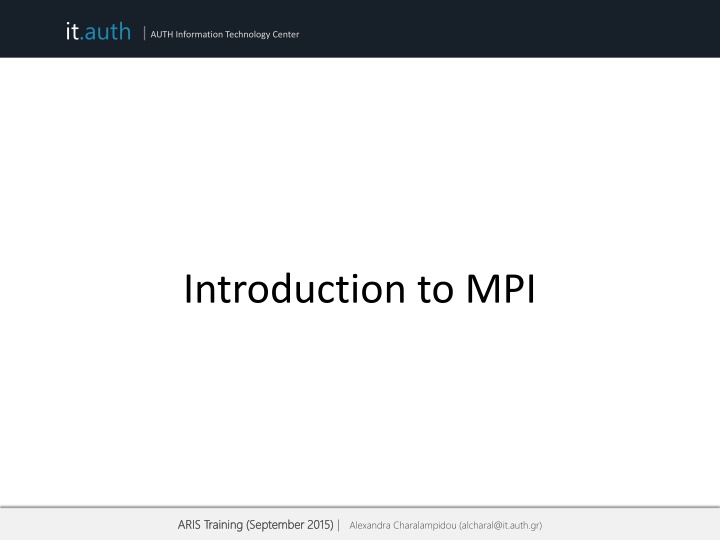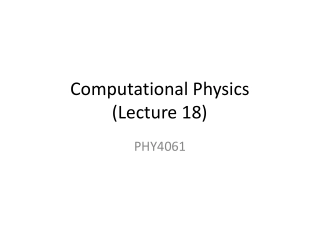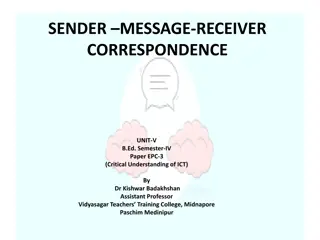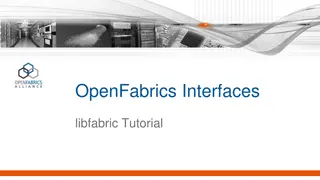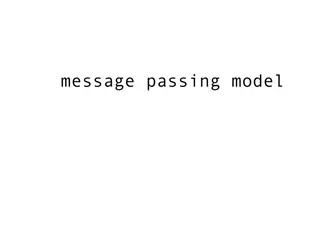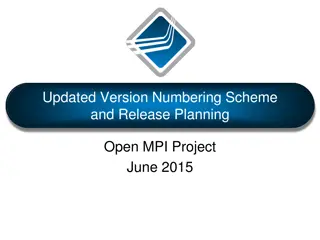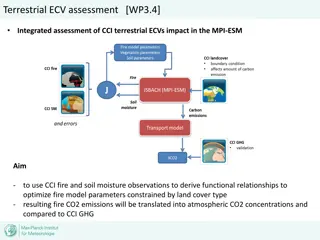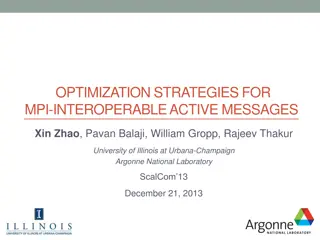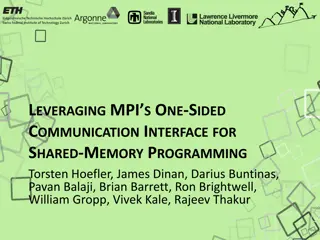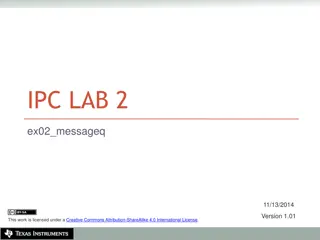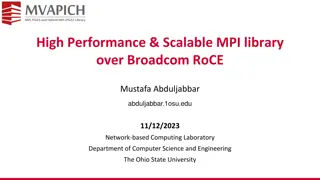Introduction to Message Passing Interface (MPI) in IT Center
Message Passing Interface (MPI) is a crucial aspect of Information Technology Center training, focusing on communication and data movement among processes. This training covers MPI features, types of communication, basic MPI calls, and more. With an emphasis on MPI's role in synchronization, data movement, and program execution, this training equips participants with the necessary knowledge to leverage MPI for efficient parallel computing.
Download Presentation

Please find below an Image/Link to download the presentation.
The content on the website is provided AS IS for your information and personal use only. It may not be sold, licensed, or shared on other websites without obtaining consent from the author.If you encounter any issues during the download, it is possible that the publisher has removed the file from their server.
You are allowed to download the files provided on this website for personal or commercial use, subject to the condition that they are used lawfully. All files are the property of their respective owners.
The content on the website is provided AS IS for your information and personal use only. It may not be sold, licensed, or shared on other websites without obtaining consent from the author.
E N D
Presentation Transcript
it.auth | AUTH Information Technology Center Introduction to MPI ARIS Training (September 2015) ARIS Training (September 2015) | Alexandra Charalampidou (alcharal@it.auth.gr)
it.auth | AUTH Information Technology Center it.auth | AUTH Information Technology Center Message Passing Model A process may be defined as a program counter and an address space Each process may have multiple threads sharing the same address space Message Passing is used for communication among processes synchronization data movement between address spaces 2 ARIS Training (September 2015) ARIS Training (September 2015)
it.auth | AUTH Information Technology Center it.auth | AUTH Information Technology Center Message Passing Interface MPI is a message passing library specification not a language or compiler specification no specific implementation Source code portability SMPs clusters heterogeneous networks 3 ARIS Training (September 2015) ARIS Training (September 2015)
it.auth | AUTH Information Technology Center it.auth | AUTH Information Technology Center Types of communication Point-to-Point calls data movement Collective calls data movement reduction operations Synchronization (barriers) Initialization, Finalization calls 4 ARIS Training (September 2015) ARIS Training (September 2015)
it.auth | AUTH Information Technology Center it.auth | AUTH Information Technology Center MPI Features Point-to-point communication Collective communication One-sided communication Communicators User defined datatypes Virtual topologies MPI-I/O 5 ARIS Training (September 2015) ARIS Training (September 2015)
it.auth | AUTH Information Technology Center it.auth | AUTH Information Technology Center Basic MPI calls MPI_Init MPI_Comm_size (get number of processes) MPI_Comm_rank (gets a rank value assigned to each process) MPI_Send (cooperative point-to-point call used to send data to receiver) MPI_Recv (cooperative point-to-point call used to receive data from sender) MPI_Finalize 6 ARIS Training (September 2015) ARIS Training (September 2015)
it.auth | AUTH Information Technology Center it.auth | AUTH Information Technology Center Hello World! 7 ARIS Training (September 2015) ARIS Training (September 2015)
it.auth | AUTH Information Technology Center it.auth | AUTH Information Technology Center Hello World! if ( ierror .ne. MPI_SUCCESS ) then ... do error handling as desired ... end if 8 ARIS Training (September 2015) ARIS Training (September 2015)
it.auth | AUTH Information Technology Center it.auth | AUTH Information Technology Center Starting and exiting the MPI environment MPI_Init C style: int MPI_Init(int *argc, char ***argv); accepts argc and argv variables (main arguments) F style: MPI_INIT ( IERROR ) Almost all Fortran MPI library calls have an integer return code Must be the first MPI function called in a program MPI_Finalize C style: int MPI_Finalize(); F style:MPI_FINALIZE ( IERROR ) 9 ARIS Training (September 2015) ARIS Training (September 2015)
it.auth | AUTH Information Technology Center it.auth | AUTH Information Technology Center Communicators All mpi specific communications take place with respect to a communicator Communicator: A collection of processes and a context MPI_COMM_WORLD is the predefined communicator of all processes Processes within a communicator are assigned a unique rank value 1 0 ARIS Training (September 2015) ARIS Training (September 2015)
it.auth | AUTH Information Technology Center it.auth | AUTH Information Technology Center A few basic considerations Q: How many processes are there? A: (N) (C) MPI_Comm_size( MPI_COMM_WORLD, &size ); (F) MPI_COMM_SIZE( MPI_COMM_WORLD, size, ierr) Q: Which one is which? A: [0,(N-1)] (C) MPI_Comm_rank( MPI_COMM_WORLD, &rank ); (F) MPI_COMM_RANK( MPI_COMM_WORLD, rank, ierr) The rank number is between 0 and (size - 1) unique per process 1 1 ARIS Training (September 2015) ARIS Training (September 2015)
it.auth | AUTH Information Technology Center it.auth | AUTH Information Technology Center Sending and receiving messages Questions Where is the data? What type of data? How much data is sent? To whom is the data sent? How does the receiver know which data to collect? 1 2 ARIS Training (September 2015) ARIS Training (September 2015)
it.auth | AUTH Information Technology Center it.auth | AUTH Information Technology Center What is contained within a message? message data buffer count datatype message envelope source/destination rank message tag (tags are used to discriminate among messages) communicator 1 3 ARIS Training (September 2015) ARIS Training (September 2015)
it.auth | AUTH Information Technology Center it.auth | AUTH Information Technology Center MPI Standard (Blocking) Send/Receive Syntax MPI_Send(void *buffer, int count, MPI_Datatype type, int dest, int tag, MPI_Comm comm); MPI_Recv(void *buffer, int count, MPI_Datatype type, int src, int tag, MPI_Comm comm, MPI_Status status); Processes are identified using dest/src values and the communicator within the message passing takes place Tags are used to deal with multiple messages in an orderly manner MPI_ANY_TAG and MPI_ANY_SOURCE may be used as wildcards on the receiving process 1 4 ARIS Training (September 2015) ARIS Training (September 2015)
it.auth | AUTH Information Technology Center it.auth | AUTH Information Technology Center MPI Datatypes 1 5 ARIS Training (September 2015) ARIS Training (September 2015)
it.auth | AUTH Information Technology Center it.auth | AUTH Information Technology Center Getting information about a message Information of source and tag is stored in MPI_Status variable status.MPI_SOURCE status.MPI_TAG MPI_Get_count can be used to determine how much data of a particular type has been received MPI_Get_count( &status, MPI_Datatype, &count); ARIS Training (September 2015) ARIS Training (September 2015)
it.auth | AUTH Information Technology Center it.auth | AUTH Information Technology Center A deadlock example (?) Program Output: from process 1 using tag 158 buf1[N-1] = 8.1 from process 0 using tag 157 buf0[N-1] = 0.9 double buf0[N], buf1[N]; MPI_Status status; int tag_of_message, src_of_message; if( rank == 0 ) { for(int i=0; i<N; i++) MPI_Send(buf0, N, MPI_DOUBLE, 1, 157, MPI_COMM_WORLD); MPI_Recv(buf1, N, MPI_DOUBLE, 1, 158, MPI_COMM_WORLD, &status); tag_of_message = status.MPI_TAG; src_of_message = status.MPI_SOURCE; cout << "from process " << src_of_message << " using tag " << tag_of_message << " buf1[N-1] = " << buf1[N-1] << endl; } else if ( rank == 1 ) { for(int i=0; i<N; i++) buf1[i] = 0.9 * (double) i; MPI_Send(buf1, N, MPI_DOUBLE, 0, 158, MPI_COMM_WORLD); MPI_Recv(buf0, N, MPI_DOUBLE, 0, 157, MPI_COMM_WORLD, &status); tag_of_message = status.MPI_TAG; src_of_message = status.MPI_SOURCE; cout << "from process " << src_of_message << " using tag " << tag_of_message << " buf0[N-1] = " << buf0[N-1] << endl; } buf0[i] = 0.1 * (double) i; ARIS Training (September 2015) ARIS Training (September 2015)
it.auth | AUTH Information Technology Center it.auth | AUTH Information Technology Center Blocking communication MPI_Send does not complete until buffer is empty (available for reuse) MPI_Recv does not complete until buffer is full (available for use) MPI uses internal buffers (the envelope) to pack messages, thus short messages do not produce deadlocks To avoid deadlocks either reverse the Send/Receive calls on one end or use the Non-Blocking calls (MPI_Isend) followed by MPI_Wait ARIS Training (September 2015) ARIS Training (September 2015)
it.auth | AUTH Information Technology Center it.auth | AUTH Information Technology Center Communication Types Blocking: If a function performs a blocking operation, then it will not return to the caller until the operation is complete. Non-Blocking: If a function performs a non-blocking operation, it will return to the caller as soon as the requested function has been initialized. Using non-blocking communication allows for higher program efficiency if calculations can be performed while communication activity is going on. This is referred to as overlapping computation with communication ARIS Training (September 2015) ARIS Training (September 2015)
it.auth | AUTH Information Technology Center it.auth | AUTH Information Technology Center Collective communications All processes within the specified communicator participate All collective operations are blocking All processes must call the collective operation No message tags are used Three classes of collective communications Data movement Collective computation Synchronization ARIS Training (September 2015) ARIS Training (September 2015)
it.auth | AUTH Information Technology Center it.auth | AUTH Information Technology Center Examples of collective operations ARIS Training (September 2015) ARIS Training (September 2015)
it.auth | AUTH Information Technology Center it.auth | AUTH Information Technology Center Synchronization MPI_Barrier ( comm ) Execution blocks until all processes in comm call it Mostly used in highly asynchronous programs 2 3 ARIS Training (September 2015) ARIS Training (September 2015)
it.auth | AUTH Information Technology Center it.auth | AUTH Information Technology Center Timing using MPI MPI_Wtime returns number of seconds since an arbitrary point in the past double mpi_t0,mpi_t1; if(rank == 0) { mpi_t0 = MPI_Wtime(); } sleep(1); MPI_Barrier( MPI_COMM_WORLD ); if(rank == 0) { mpi_t1 = MPI_Wtime(); printf("# MPI_time = %f\n", mpi_t1-mpi_t0); } ARIS Training (September 2015) ARIS Training (September 2015)
it.auth | AUTH Information Technology Center it.auth | AUTH Information Technology Center Mixing MPI and OpenMP Hybrid architectures Clusters on SMPs HPC Platforms IBM BlueGene (i.e. Jugene) IBM P6 (i.e. Huygens) Good starting point Mapping of MPI on nodes (interconnection layer) Multithreading with OpenMP inside SMPs ARIS Training (September 2015) ARIS Training (September 2015)
it.auth | AUTH Information Technology Center it.auth | AUTH Information Technology Center Addition of two vectors (OMP) int main(int argv, char **argv) { int n, i; double *x, *y, *buff; n = atoi(argv[1]); x = (double *)malloc(n*sizeof(double)); y = (double *)malloc(n*sizeof(double)); . . . #pragma omp parallel for private(i) shared (x,y) for (i=0; i<n; i++){ x[i] = x[i] + y[i]; } } ARIS Training (September 2015) ARIS Training (September 2015)
it.auth | AUTH Information Technology Center it.auth | AUTH Information Technology Center Addition of two vectors (MPI) #include mpi.h int main(int argc, char **argv){ int rnk, sz, n, i; double *x, *y, *buff; n = atoi(argv[1]) MPI_Init(&argc, &argv); MPI_Comm_rank(MPI_COMM_WORLD, &rnk); MPI_Comm_size(MPI_COMM_WORLD, &sz); chunk = n / sz; . . MPI_Scatter(&buff[rnk*chunk],chunk,MPI_DOUBLE,x,chunk,MPI_DOUBLE,0,MPI_COMM_WORLD); MPI_Scatter(&buff[rnk*chunk],chunk,MPI_DOUBLE,y,chunk,MPI_DOUBLE,0,MPI_COMM_WORLD); for (i=0; i<chunk; i++) x[i] = x[i] + y[i]; MPI_Gather(x,chunk,MPI_DOUBLE,buff,chunk,MPI_DOUBLE,0,MPI_COMM_WORLD); } MPI_Finalize(); ARIS Training (September 2015) ARIS Training (September 2015)
it.auth | AUTH Information Technology Center it.auth | AUTH Information Technology Center Addition of two vectors (HYBRID) #include mpi.h int main(int argc, char **argv){ int rnk, sz, n, I, info; double *x, *y, *buff; n = atoi(argv[1]); MPI_Init_thread(&argc, &argv, MPI_THREAD_FUNNELED, &info); MPI_Comm_size(MPI_COMM_WORLD, &sz); chunk = n / sz; MPI_Scatter(&buff[rnk*chunk],chunk,MPI_DOUBLE,x,chunk,MPI_DOUBLE,0,MPI_COMM_ WORLD); MPI_Scatter(&buff[rnk*chunk],chunk,MPI_DOUBLE,y,chunk,MPI_DOUBLE,0,MPI_COMM_ WORLD); #pragma omp parallel for for (i=0; i<chunk; i++) x[i] = x[i] + y[i]; MPI_Gather(x,chunk,MPI_DOUBLE,buff,chunk,MPI_DOUBLE,0,MPI_COMM_WORLD); MPI_Finalize(); } ARIS Training (September 2015) ARIS Training (September 2015)
it.auth | AUTH Information Technology Center it.auth | AUTH Information Technology Center Compile and submit a mm job Master process decomposes matrix a and provides slave processes with input. Each slave process caries ns=nm/sz rows of a and the complete b matrix to carry out computations. Results are sent back to master who prints out timing. ARIS Training (September 2015) ARIS Training (September 2015)
it.auth | AUTH Information Technology Center it.auth | AUTH Information Technology Center 3 0 ARIS Training (September 2015) ARIS Training (September 2015)
